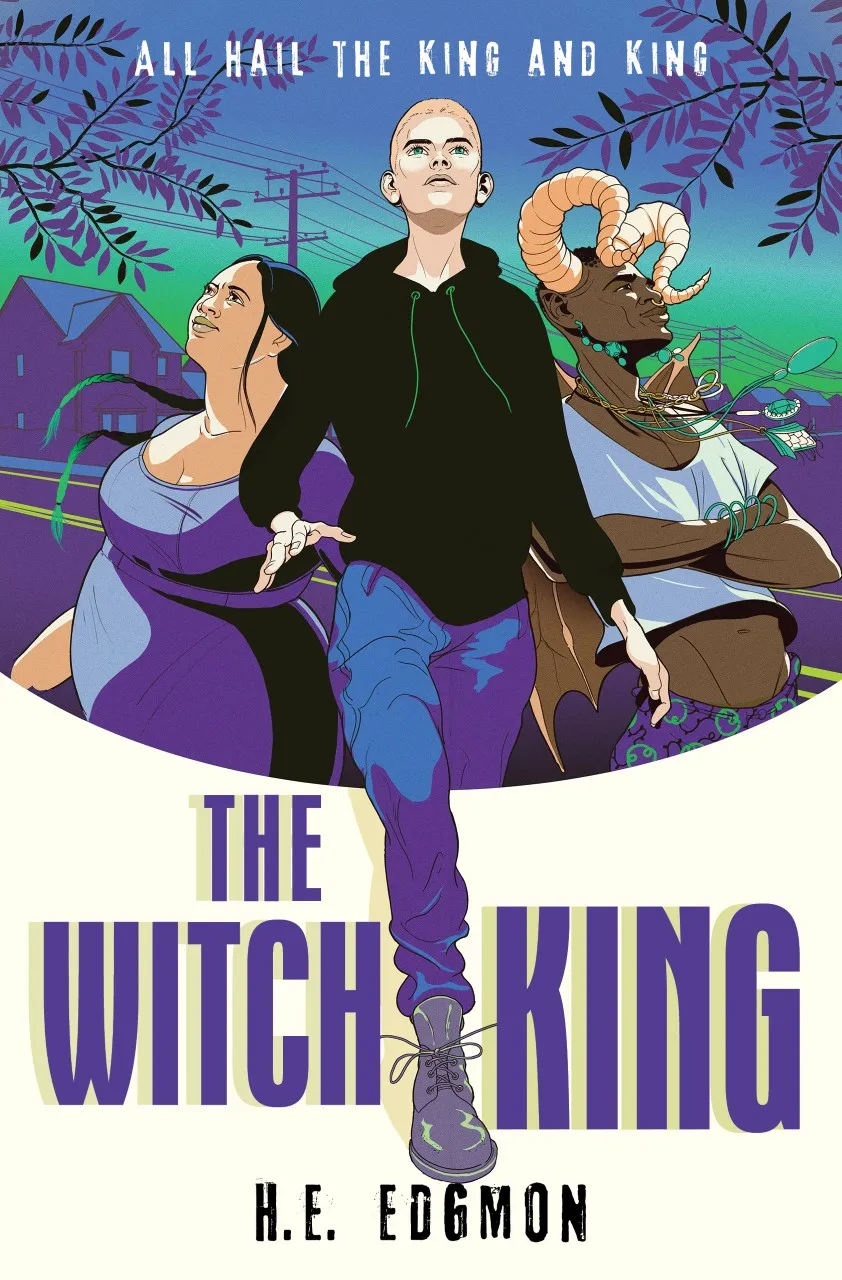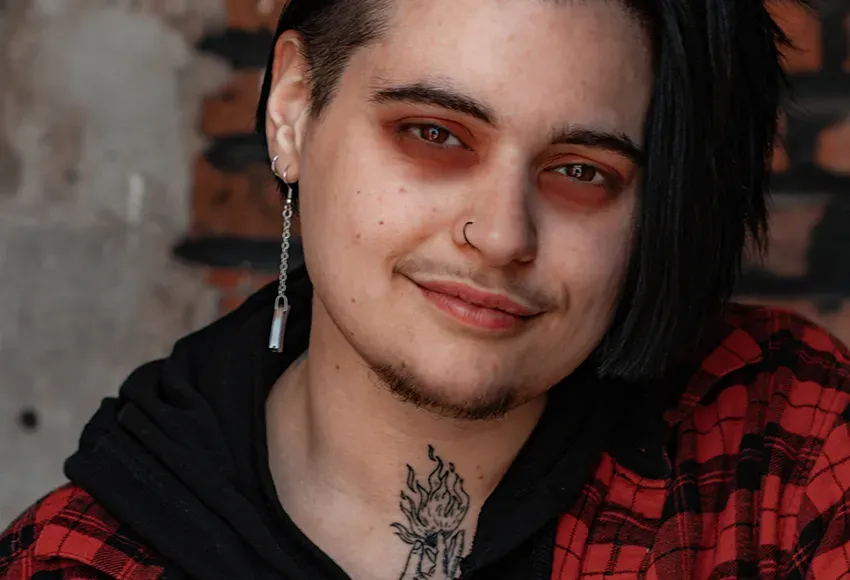I recently sat down with Seattle writer and Trans man H.E. Edgmond, author of the fantasy novel The Witch King (Inkyard Press 2021), to talk about how he uses the genre of fantasy world to reflect on this world. In The Witch King, Edgmond asks a fundamental question: What if a witch were Trans? The whole novel emerges from that question, telling the story of Wyatt, a Trans man born a witch in a world where witches remain second-class citizens. Through the story in another world, Edgmond confronts issues in this one: inequality, racism, class divisions, and of course the ways gender identity and sexuality impact structures of society.
Edgmond uses Wyatt's identity as a witch to explore ways in which the cisgender, heterosexual world stigmatizes Trans identities. In the novel's foreword, he writes, "Wyatt's struggles as a witch mirror many of the struggles Queer people, especially Trans people, face in the real world. He deals with losing those who are supposed to love him and the guilt of that loss. He's treated like a pariah by a regime that does not want to understand him. And he feels as if his future is not his own, being forced to play a role he knows he doesn't belong in."
In The Witch King, Wyatt learns what it means to be a witch. His magical abilities make him an outcast from the rest of his kingdom. While there are no "TERFS" in the novel – Trans exclusionary feminists who dispute the existence and reality of Trans people – there are cisgender witches who don't fully accept the Trans witch Wyatt, and so the fantasy novel reflects Trans people's real-world struggles against transphobia.
The writing process
For Edgmond, writing The Witch King was a way to connect to some of his own experiences as a Trans man and to bring joy and fantasy into his everyday world.
His concept for the story came from a longtime love of fanfiction. "I grew up on fanfiction. I love fanfiction, mainly because it was the one place where I saw Queer characters that reflected my friend group and myself because we didn't see a lot of that in traditional publishing at the time." One of his favorite parts of fanfic was the predictability that comes with the well-worn tropes. "You know what to expect. One of my favorite tropes to play with was the arranged marriage trope. One day I was like wouldn't it be interesting to do this with the 'bride' ending up being a Trans guy, and it just spiraled from there."
Once he conceptualized his idea, Edgmond set a goal for himself. By the end of 2019, he would have a finished novel. "I started writing New Year's Day of 2019. I finished in three months, then I revised for another couple of months. I got agented fairly quickly, in July of 2019, and then it had sold at the beginning of 2020."
Before he could sit down and write the story, he first had to plot it all out. "I have to have a strong idea of the entire story from start to finish before I can sit down and write. For me, it has to be fully fleshed out before I can start putting words to paper. I will spend weeks or months plotting a story."
Through the plotting process came his two main characters, Wyatt and Emyr. Next came worldbuilding. "I wanted to find out how to create the world around them and make it as complicated as possible," Edgmond laughed. Fans are often curious about why he decided to create a fictional world centered around both witches and fae. "I have been asked a few times, how did you combine fae and witches, we don't normally see that in one story. The answer, I thought they were both cool and wanted to write about them."

Creating authentic LGBTQIA+ characters
When it came to writing his protagonist, Wyatt, Edgmond had specific goals in mind. He didn't want to create a "perfect" person. Instead he wanted to show that Trans people, like anyone else, can be complicated, bitter, and sometimes unlikeable, and that does not take away any of the value or importance of their stories.
"I wanted the opportunity to write about a character, specifically a young Trans character, who had experienced a great deal of trauma and was allowed to be angry. He was allowed to have the agency to just be mad and fight for himself in a way that maybe came across as selfish. I feel like in a lot of Trans led stories, we fall into the pitfall of Trans characters have to be perfect, understanding, and meek. And they have to teach us something. He doesn't teach us anything. He's just a mad teenage boy who wants the best for himself."
Wyatt became a way for him to process his own experiences on paper. "There is a lot of rage and trauma that Wyatt is holding onto, [experiences] that I know I, in particular, and a lot of people in the Queer and Trans community are told to be ashamed of."
Edgmond says that as he continues his career in writing, he will always aim to center Queer and especially Trans voices in his work. For him, this also means sticking with the fantasy genre. "My brain wants to turn everything into a magical metaphor," he laughed.
Aside from the magical metaphors he so brilliantly creates, he is also determined to stick with Queer fantasy books because the genre allows writers to break away from the demand to write with straight audiences in mind. "So often Queer characters have been forced into only being in contemporary stories because in contemporary stories you can make it into 'issue' books. Teach us about coming out. Teach us about being gay. Teach us about being Trans. It's harder to do that in fantasy."
A reader-centric writer
Edgmond listens to readers. For LGBTQ readers in particular, he says, "there is a huge desire for books, fantasy books, and epic adventures, that are just about Queer characters that don't have to be about a character being Queer. That's part of it for me. Fulfilling something I always wanted to read, but there was just a lack of it. The other part – I don't want to write stories about homophobia or transphobia, but [stories] that deal with the ways Queer characters are marginalized. The way that I can do that is through magical metaphors. The way that magic can take the place of that in the society."
Unlike so many books out there, The Witch King was written specifically for Trans people. "The book is written for a Trans audience primarily. It is also written for Trans people who don't even know that they are Trans, who have never been given anything that reflects their experiences and the ways they see themselves. I hope there is at least one kid out there who can read this book and go 'oh, this is what I've been feeling. This describes my experiences. I just hope it gives them the language they will need to talk about themselves."
The novel intentionally showcases a wide cast of LGBTQIA+ characters so that many readers can find experiences in common with the characters. With so few books centering on the experiences of Trans people, Edgmond wanted to make sure readers know each individual has different experiences, and just because theirs may not match Wyatt's does not mean it is any less valid. "My experiences as a Trans person can and will vary wildly from another Trans person's experiences."
The best way to show young people the diversity of Trans experiences is to include more representation in media. He says, "What kids need more than anything is a wide variety of stories to choose from, in the same way, we have always seen a wide variety of stories to choose from about cis/het characters."
One element of Trans identity Edgmond wanted to showcase in the novel was Wyatt's relationship with his body. "I know that for many people there is a big debate surrounding dysphoria and how transness is directly related to how much a Trans character hates their body," he says, "Wyatt does not hate his body. Wyatt experiences social dysphoria, but he does not experience dysphoria in his body."
This small detail made a huge difference to some readers. One reader reached out to share that they were grateful to read about a Trans man who liked his body, and most importantly, didn't use magic to change it into a cis body.
Wyatt's adventures continue in Edgmond's highly anticipated sequel, The Fae Keeper, which is expected to release on May 31, 2022. "The Fae Keeper picks up right at the end of The Witch King, which, no spoilers, ends on a pretty dramatic note, and it does not slow down once the entire time. It is a book filled with many, many twists and turns and is just personally the work I am most proud of. I am so excited to share it with people." Readers can expect more magical metaphors about fascist governments, more Queer romance, and more reclamation of the experience of witches.


